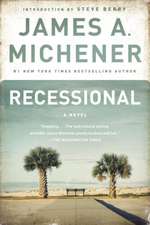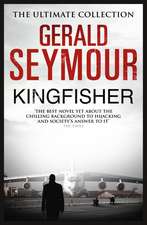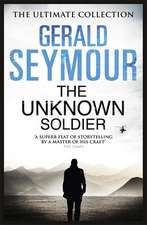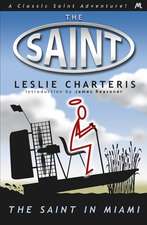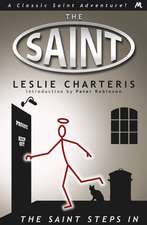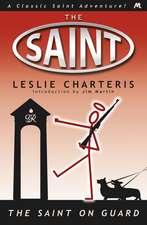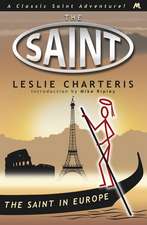The Charlemagne Pursuit: Cotton Malone
Autor Steve Berryen Limba Engleză Paperback – 30 sep 2009
| Toate formatele și edițiile | Preț | Express |
|---|---|---|
| Paperback (2) | 52.15 lei 3-5 săpt. | +30.48 lei 7-11 zile |
| Hodder & Stoughton – 29 oct 2009 | 52.15 lei 3-5 săpt. | +30.48 lei 7-11 zile |
| BALLANTINE BOOKS – 31 oct 2009 | 61.85 lei 3-5 săpt. |
Din seria Cotton Malone
-
 Preț: 58.43 lei
Preț: 58.43 lei - 23%
 Preț: 49.76 lei
Preț: 49.76 lei - 22%
 Preț: 49.90 lei
Preț: 49.90 lei - 22%
 Preț: 50.02 lei
Preț: 50.02 lei - 22%
 Preț: 50.96 lei
Preț: 50.96 lei - 22%
 Preț: 45.17 lei
Preț: 45.17 lei - 24%
 Preț: 43.59 lei
Preț: 43.59 lei - 21%
 Preț: 46.49 lei
Preț: 46.49 lei - 21%
 Preț: 45.98 lei
Preț: 45.98 lei - 21%
 Preț: 46.78 lei
Preț: 46.78 lei - 22%
 Preț: 45.08 lei
Preț: 45.08 lei - 23%
 Preț: 49.79 lei
Preț: 49.79 lei - 22%
 Preț: 45.00 lei
Preț: 45.00 lei -
 Preț: 61.69 lei
Preț: 61.69 lei - 22%
 Preț: 49.93 lei
Preț: 49.93 lei - 22%
 Preț: 109.84 lei
Preț: 109.84 lei - 22%
 Preț: 50.39 lei
Preț: 50.39 lei -
 Preț: 119.76 lei
Preț: 119.76 lei -
 Preț: 97.16 lei
Preț: 97.16 lei
Preț: 47.34 lei
Nou
Puncte Express: 71
Preț estimativ în valută:
9.06€ • 9.84$ • 7.61£
9.06€ • 9.84$ • 7.61£
Carte indisponibilă temporar
Doresc să fiu notificat când acest titlu va fi disponibil:
Se trimite...
Preluare comenzi: 021 569.72.76
Specificații
ISBN-13: 9780345518637
ISBN-10: 0345518632
Pagini: 551
Dimensiuni: 106 x 178 x 27 mm
Greutate: 0.26 kg
Editura: Random House
Colecția Ballantine Books
Seria Cotton Malone
ISBN-10: 0345518632
Pagini: 551
Dimensiuni: 106 x 178 x 27 mm
Greutate: 0.26 kg
Editura: Random House
Colecția Ballantine Books
Seria Cotton Malone
Descriere
Descriere de la o altă ediție sau format:
Cotton Malone's most intense adventure yet - a personal mission to find out how his father died years ago in Antarctica on a secret government submarine. A pacy international thriller with a historical twist, from the New York Times bestselling author.
Notă biografică
Steve Berry is the New York Times and #1 internationally bestselling author of The King’s Deception, The Columbus Affair, The Jefferson Key, The Emperor’s Tomb, The Paris Vendetta, The Charlemagne Pursuit, The Venetian Betrayal, The Alexandria Link, The Templar Legacy, The Third Secret, The Romanov Prophecy, and The Amber Room. His books have been translated into 40 languages with more than 15,000,000 printed copies in 51 countries.
History lies at the heart of every Steve Berry novel. It’s this passion, one he shares with his wife, Elizabeth, that led them to create History Matters, a foundation dedicated to historic preservation. Since 2009 Steve and Elizabeth have traveled across the country to save endangered historic treasures, raising money via lectures, receptions, galas, luncheons, dinners, and their popular writers’ workshops. To date, nearly 2,000 students have attended those workshops. In 2012 their work was recognized by the American Library Association, which named Steve the first spokesman for National Preservation Week. He was also appointed by the Smithsonian Board of Regents to serve on the Smithsonian Libraries Advisory Board to help promote and support the libraries in their mission to provide information in all forms to scientists, curators, scholars, students and the public at large. He has received the Royden B. Davis Distinguished Author Award and the 2013 Writers for Writers Award from Poets & Writers. His novel The Columbus Affair earned him the Anne Frank Human Writes Award, and his historic preservation work merited the 2013 Silver Bullet from International Thriller Writers.
Steve Berry was born and raised in Georgia, graduating from the Walter F. George School of Law at Mercer University. He was a trial lawyer for 30 years and held elective office for 14 of those years. He is a founding member of International Thriller Writers—a group of more than 2,000 thriller writers from around the world—and served three years as its co-president.
For more information, visit www.steveberry.org.
From the Hardcover edition.
History lies at the heart of every Steve Berry novel. It’s this passion, one he shares with his wife, Elizabeth, that led them to create History Matters, a foundation dedicated to historic preservation. Since 2009 Steve and Elizabeth have traveled across the country to save endangered historic treasures, raising money via lectures, receptions, galas, luncheons, dinners, and their popular writers’ workshops. To date, nearly 2,000 students have attended those workshops. In 2012 their work was recognized by the American Library Association, which named Steve the first spokesman for National Preservation Week. He was also appointed by the Smithsonian Board of Regents to serve on the Smithsonian Libraries Advisory Board to help promote and support the libraries in their mission to provide information in all forms to scientists, curators, scholars, students and the public at large. He has received the Royden B. Davis Distinguished Author Award and the 2013 Writers for Writers Award from Poets & Writers. His novel The Columbus Affair earned him the Anne Frank Human Writes Award, and his historic preservation work merited the 2013 Silver Bullet from International Thriller Writers.
Steve Berry was born and raised in Georgia, graduating from the Walter F. George School of Law at Mercer University. He was a trial lawyer for 30 years and held elective office for 14 of those years. He is a founding member of International Thriller Writers—a group of more than 2,000 thriller writers from around the world—and served three years as its co-president.
For more information, visit www.steveberry.org.
From the Hardcover edition.
Recenzii
'A meticulous researcher, Berry carefully integrates such elements as Charlemagne, Nazis, ancient manuscripts, historical puzzles and scientific surprises into the plot. Those who relish suspense in the Da Vinci Code vein will snap this one up, the best yet in the series.' -- Publisher's Weekly (Starred Review) 'Berry outdoes himself in his latest Cotton Malone adventure ... So much is going on that there is enough material for two good books, let alone one great one. Mixed in with the complicated action, Berry finds the time to explore the characters as well, making this his most personal and best book to date.' -- Library Journal (Starred Review) 'A solid action thriller' -- Booklist 'Berry inundates readers with lessons in history, theology, geology, and through the political regimes of another era with the deft hand of a surgeon. He slices and stitches information skillfully throughout this hair-raising adventure. The plot is complicated and laden with emotion. Berry has another blockbuster.' -- Romantic Times Book Review 'Action-packed, fast paced and engaging' -- Sunday Express on THE VENETIAN BETRAYAL 20080504 'Pure intrigue. Pure fun.' -- Clive Cussler on Steve Berry 20080504 'Sexy, illuminating...my kind of thriller' -- Dan Brown on THE AMBER ROOM 20080504 'Complex and fast-moving thriller writing, delivered with a great deal of dash, and shades of The Da Vinci Code' -- Good Book Guide on THE TEMPLAR LEGACY 20080504 'International intrigue, swashbuckling action, indestructible hero from the American South...Not to be missed.' -- Kirkus Reviews, on THE ROMANOV PROPHECY 20080504
Extras
Chapter One
Garmisch, Germany
Tuesday, December 11, The Present
1:40 pm
Cotton Malone hated enclosed spaces.
His current unease was amplified by a packed cable car. Most of the passengers were on vacation, dressed in colorful garb, shouldering poles and skis. He sensed a variety of nationalities. Some Italians, a few Swiss, a handful of French, but mainly Germans. He’d been one of the first to climb aboard and, to relieve his discomfort, he’d made his way close to one of the frosty windows. Ten thousand feet above and closing, the Zugspitze stood silhouetted against a steel- blue sky, the imposing gray summit draped in a late- autumn snow.
Not smart, agreeing to this location.
The car continued its giddy ascent, passing one of several steel trestles that rose from the rocky crags.
He was unnerved, and not simply from the crowded surroundings. Ghosts awaited him atop Germany’s highest peak. He’d avoided this rendezvous for nearly four decades. People like him, who buried their past so determinedly, should not help it from the grave so easily.
Yet here he was, doing exactly that.
Vibrations slowed as the car entered, then stopped at the summit station.
Skiers flooded off toward another lift that would take them down to a high- altitude corrie, where a chalet and slopes waited. He didn’t ski, never had, never wanted to.
He made his way through the visitor center, identified by a yellow placard as MŸncher Haus. A restaurant dominated one half of the building, the rest housed a theater, a snack bar, an observatory, souvenir shops, and a weather station.
He pushed through thick glass doors and stepped out onto a railed terrace. Bracing Alpine air stung his lips. According to Stephanie Nelle his contact should be waiting on the observation deck. One thing was obvious. Ten thousand feet in the high Alps certainly added a heightened measure of privacy to their meeting.
The Zugspitze lay on the border. A succession of snowy crags rose south toward Austria. To the north spanned a soup- bowl valley ringed by rock- ribbed peaks. A gauze of frosty mist shielded the German village of Garmisch and its companion, Partenkirchen. Both were sports meccas, and the region catered not only to skiing but also bobsledding, skating, and curling.
More sports he’d avoided.
The observation deck was deserted save for an elderly couple and a few skiers who’d apparently paused to enjoy the view. He’d come to solve a mystery, one that had preyed on his mind ever since that day when the men in uniforms came to tell his mother that her husband was dead.
"Contact was lost with the submarine forty- eight hours ago. We dispatched search and rescue ships to the North Atlantic, which have combed the last known position. Wreckage was found six hours ago. We waited to tell the families until we were sure there was no chance of survivors."
His mother had never cried. Not her way. But that didn’t mean she wasn’t devastated. Years passed before questions formed in his teenage mind. The government offered little explanation beyond official releases. When he’d first joined the navy he’d tried to access the court of inquiry’s investigative report on the sub’s sinking, but learned it was classified. He’d tried again after becoming a Justice Department agent, possessed of a high security clearance. No luck. When Gary, his fifteen-year- old, visited over the summer, he’d faced new questions. Gary had never known his grandfather, but the boy had wanted to know more about him and, especially, how he died. The press had covered the sinking of the USS Blazek in November 1971, so they’d read many of the old accounts on the Internet. Their talk had rekindled his own doubts– enough that he’d finally done something about them.
He plunged balled fists into his parka and wandered the terrace.
Telescopes dotted the railing. At one stood a woman, her dark hair tied in an unflattering bun. She was dressed in a bright outfit, skis and poles propped beside her, studying the valley below.
He casually walked over. One rule he’d learned long ago. Never hurry. It only bred trouble.
"Quite a scene," he said.
She turned. "Certainly is."
Her face was the color of cinnamon which, combined with what he regarded as Egyptian features in her mouth, nose, and eyes signaled some Middle Eastern ancestry.
"I’m Cotton Malone."
"How did you know I was the one who came to meet you?"
He motioned at the brown envelope lying at the base of the telescope. "Apparently this is not a high- pressure mission." He smiled. "Just running an errand?"
"Something like that. I was coming to ski. A week off, finally. Always wanted to do it. Stephanie asked if I could bring"–she motioned at the envelope–"that along." She went back to her viewing. "You mind if I finish this? It cost a euro and I want to see what’s down there."
She revolved the telescope, studying the German valley that stretched for miles below.
"You have a name?" he asked.
"Jessica," she said, her eyes still to the eyepiece.
He reached for the envelope.
Her boot blocked the way. "Not yet. Stephanie said to make sure you understand that the two of you are even."
Last year he’d helped out his old boss in France. She’d told him then that she owed him a favor and that he should use it wisely.
And he had.
"Agreed. Debt paid."
She turned from the telescope. Wind reddened her cheeks. "I’ve heard about you at the Magellan Billet. A bit of a legend. One of the original twelve agents."
"I didn’t realize I was so popular."
"Stephanie said you were modest, too."
He wasn’t in the mood for compliments. The past awaited him. "Could I have the file?"
Her eyes sparked. "Sure."
He retrieved the envelope. The first thought that flashed through his mind was how something so thin might answer so many questions.
"That must be important," she said.
Another lesson. Ignore what you don’t want to answer. "You been with the Billet long?"
"Couple of years." She stepped from the telescope mount. "Don’t like it, though. I’m thinking about getting out. I hear you got out early, too."
As carelessly as she handled herself, quitting seemed like a good career move. During his twelve years he’d taken only three vacations, during which he’d stayed on constant guard. Paranoia was one of many occupational hazards that came with being an agent, and two years of voluntary retirement had yet to cure the malady.
"Enjoy the skiing," he said to her.
Tomorrow he’d fly back to Copenhagen. Today he was going to make a few stops at the rare- book shops in the area–an occupational hazard of his new profession. Bookseller.
She threw him a glare as she grabbed her skis and poles. "I plan to."
They left the terrace and walked back through the nearly deserted visitor center. Jessica headed for the lift that would take her down to the corrie. He headed for the cable car that would drop him ten thousand feet back to ground level.
He stepped into the empty car, holding the envelope. He liked the fact that no one was aboard. But just before the doors closed, a man and woman rushed on, hand in hand. The attendant slammed the doors shut from the outside and the car eased from the station.
He stared out the forward windows.
Enclosed spaces were one thing. Cramped, enclosed spaces were another. He wasn’t claustrophobic. More a sense of freedom denied. He’d tolerated it in the past–having found himself underground on more than one occasion–but his discomfort was one reason why, years ago, when he joined the navy, unlike his father, he hadn’t opted for submarines. "Mr. Malone." He turned. The woman stood, holding a gun. "I’ll take that envelope."
Garmisch, Germany
Tuesday, December 11, The Present
1:40 pm
Cotton Malone hated enclosed spaces.
His current unease was amplified by a packed cable car. Most of the passengers were on vacation, dressed in colorful garb, shouldering poles and skis. He sensed a variety of nationalities. Some Italians, a few Swiss, a handful of French, but mainly Germans. He’d been one of the first to climb aboard and, to relieve his discomfort, he’d made his way close to one of the frosty windows. Ten thousand feet above and closing, the Zugspitze stood silhouetted against a steel- blue sky, the imposing gray summit draped in a late- autumn snow.
Not smart, agreeing to this location.
The car continued its giddy ascent, passing one of several steel trestles that rose from the rocky crags.
He was unnerved, and not simply from the crowded surroundings. Ghosts awaited him atop Germany’s highest peak. He’d avoided this rendezvous for nearly four decades. People like him, who buried their past so determinedly, should not help it from the grave so easily.
Yet here he was, doing exactly that.
Vibrations slowed as the car entered, then stopped at the summit station.
Skiers flooded off toward another lift that would take them down to a high- altitude corrie, where a chalet and slopes waited. He didn’t ski, never had, never wanted to.
He made his way through the visitor center, identified by a yellow placard as MŸncher Haus. A restaurant dominated one half of the building, the rest housed a theater, a snack bar, an observatory, souvenir shops, and a weather station.
He pushed through thick glass doors and stepped out onto a railed terrace. Bracing Alpine air stung his lips. According to Stephanie Nelle his contact should be waiting on the observation deck. One thing was obvious. Ten thousand feet in the high Alps certainly added a heightened measure of privacy to their meeting.
The Zugspitze lay on the border. A succession of snowy crags rose south toward Austria. To the north spanned a soup- bowl valley ringed by rock- ribbed peaks. A gauze of frosty mist shielded the German village of Garmisch and its companion, Partenkirchen. Both were sports meccas, and the region catered not only to skiing but also bobsledding, skating, and curling.
More sports he’d avoided.
The observation deck was deserted save for an elderly couple and a few skiers who’d apparently paused to enjoy the view. He’d come to solve a mystery, one that had preyed on his mind ever since that day when the men in uniforms came to tell his mother that her husband was dead.
"Contact was lost with the submarine forty- eight hours ago. We dispatched search and rescue ships to the North Atlantic, which have combed the last known position. Wreckage was found six hours ago. We waited to tell the families until we were sure there was no chance of survivors."
His mother had never cried. Not her way. But that didn’t mean she wasn’t devastated. Years passed before questions formed in his teenage mind. The government offered little explanation beyond official releases. When he’d first joined the navy he’d tried to access the court of inquiry’s investigative report on the sub’s sinking, but learned it was classified. He’d tried again after becoming a Justice Department agent, possessed of a high security clearance. No luck. When Gary, his fifteen-year- old, visited over the summer, he’d faced new questions. Gary had never known his grandfather, but the boy had wanted to know more about him and, especially, how he died. The press had covered the sinking of the USS Blazek in November 1971, so they’d read many of the old accounts on the Internet. Their talk had rekindled his own doubts– enough that he’d finally done something about them.
He plunged balled fists into his parka and wandered the terrace.
Telescopes dotted the railing. At one stood a woman, her dark hair tied in an unflattering bun. She was dressed in a bright outfit, skis and poles propped beside her, studying the valley below.
He casually walked over. One rule he’d learned long ago. Never hurry. It only bred trouble.
"Quite a scene," he said.
She turned. "Certainly is."
Her face was the color of cinnamon which, combined with what he regarded as Egyptian features in her mouth, nose, and eyes signaled some Middle Eastern ancestry.
"I’m Cotton Malone."
"How did you know I was the one who came to meet you?"
He motioned at the brown envelope lying at the base of the telescope. "Apparently this is not a high- pressure mission." He smiled. "Just running an errand?"
"Something like that. I was coming to ski. A week off, finally. Always wanted to do it. Stephanie asked if I could bring"–she motioned at the envelope–"that along." She went back to her viewing. "You mind if I finish this? It cost a euro and I want to see what’s down there."
She revolved the telescope, studying the German valley that stretched for miles below.
"You have a name?" he asked.
"Jessica," she said, her eyes still to the eyepiece.
He reached for the envelope.
Her boot blocked the way. "Not yet. Stephanie said to make sure you understand that the two of you are even."
Last year he’d helped out his old boss in France. She’d told him then that she owed him a favor and that he should use it wisely.
And he had.
"Agreed. Debt paid."
She turned from the telescope. Wind reddened her cheeks. "I’ve heard about you at the Magellan Billet. A bit of a legend. One of the original twelve agents."
"I didn’t realize I was so popular."
"Stephanie said you were modest, too."
He wasn’t in the mood for compliments. The past awaited him. "Could I have the file?"
Her eyes sparked. "Sure."
He retrieved the envelope. The first thought that flashed through his mind was how something so thin might answer so many questions.
"That must be important," she said.
Another lesson. Ignore what you don’t want to answer. "You been with the Billet long?"
"Couple of years." She stepped from the telescope mount. "Don’t like it, though. I’m thinking about getting out. I hear you got out early, too."
As carelessly as she handled herself, quitting seemed like a good career move. During his twelve years he’d taken only three vacations, during which he’d stayed on constant guard. Paranoia was one of many occupational hazards that came with being an agent, and two years of voluntary retirement had yet to cure the malady.
"Enjoy the skiing," he said to her.
Tomorrow he’d fly back to Copenhagen. Today he was going to make a few stops at the rare- book shops in the area–an occupational hazard of his new profession. Bookseller.
She threw him a glare as she grabbed her skis and poles. "I plan to."
They left the terrace and walked back through the nearly deserted visitor center. Jessica headed for the lift that would take her down to the corrie. He headed for the cable car that would drop him ten thousand feet back to ground level.
He stepped into the empty car, holding the envelope. He liked the fact that no one was aboard. But just before the doors closed, a man and woman rushed on, hand in hand. The attendant slammed the doors shut from the outside and the car eased from the station.
He stared out the forward windows.
Enclosed spaces were one thing. Cramped, enclosed spaces were another. He wasn’t claustrophobic. More a sense of freedom denied. He’d tolerated it in the past–having found himself underground on more than one occasion–but his discomfort was one reason why, years ago, when he joined the navy, unlike his father, he hadn’t opted for submarines. "Mr. Malone." He turned. The woman stood, holding a gun. "I’ll take that envelope."









